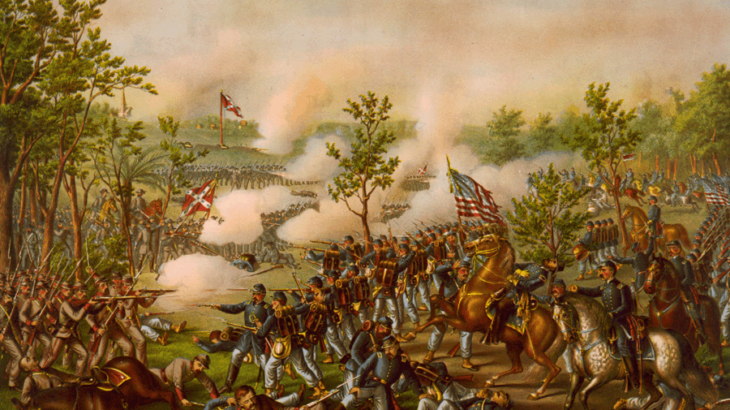July 22, 1864: Fall of Atlanta and Assurance of President Abraham Lincoln’s Reelection
Abraham Lincoln is usually considered one of our nation’s greatest presidents. But, what many people may not know is that Lincoln was not a very popular president during his first term and he nearly was not reelected in 1864. For many months leading into the presidential election of that year, Lincoln resigned himself to a simple fact that he was not going to be reelected. He told a visitor to the White House in the fall of 1864, “I am going to be beaten…and unless some great change takes place, badly beaten.”
Lincoln’s administration had presided over hundreds of thousands of young men killed and wounded in the then three-year-old struggle to give our nation, as Lincoln declared at Gettysburg, its “new birth of freedom” during the Civil War. The year 1864 had been the bloodiest of the war so far and Union armies were being decimated as Union General Ulysses S. Grant was making his final push to destroy the army of Confederate General Robert E. Lee and bring the war to an end. At the same time, General William T. Sherman was moving toward Georgia in the summer of 1864, hoping to destroy the Confederate armies in that region as well.
Lincoln was a tremendously unpopular president in 1864 inside and outside of his own political party. Democrats hated Lincoln and blamed him for the longevity of the war. Radical Republicans did not feel that he went far enough to extend equal rights to African-Americans. The war was unpopular and seemed unwinnable for the Union. Lincoln’s recent Emancipation Proclamation had also turned many Northern voters against Lincoln as they believed that equality for former slaves was something that would occur and they were not ready for it.
Between the Emancipation Proclamation and the casualty numbers of the Union army, Lincoln felt as though his administration would be leaving the White House in 1865. He urged his cabinet members to cooperate with the new president to make the transition of power easier, which would hopefully bring the nation back together quicker. A series of events were taking place in the Western theater of the war where one of Lincoln’s generals was about to present him with two gifts in 1864: the city of Atlanta and the reelection of his administration.
General Sherman met president Lincoln in 1861 at the beginning of the war and he was not overly impressed with him. He felt President Lincoln’s attitude toward the South was naive and could damage the Union’s early response to the war. Lincoln was not particularly impressed with Sherman at their first meeting either. But, those attitudes would change as the war progressed.
Sherman had achieved great success in fighting in the Western theater of the war from Shiloh to Chattanooga and was poised to strike a lethal blow into the heart of the Confederacy by marching his armies through the state of Georgia and capturing its capital city of Atlanta. The capture of Atlanta would destroy a vital rail center and supply depot, as well as demoralize the Confederacy.
Sherman and his 100,000 troops left Chattanooga in May of 1864 and by July, Sherman and his army had reached the outskirts of Atlanta. On September 1, Confederate forces evacuated the city. The Northern reaction to the taking of Atlanta and victories in Virginia at the same time was jubilation. Instead of feeling the war was lost, the exact opposite opinion was now prevalent. It now seemed that the Lincoln administration would be the first reelected since Andrew Jackson in 1832.
President Lincoln won the 1864 election by receiving over 55 percent of the popular vote and winning the electoral vote 212 to 21 over his Democratic opponent, former general George B. McClellan. He was then able to manage the end of the Civil War and the passage of the 13th Amendment to the U.S. Constitution, banning slavery in the United States forever. His presidency would be remembered as the reason why our nation is still one nation, under God, and dedicated to “the proposition that all men are created equal.” Washington created our nation, Jefferson and Madison gave it life and meaning with their ideas and words, and Lincoln saved it. He may have not had the chance to do so without the military success of General Sherman and his armies in 1864.
Val Crofts is as Social Studies teacher from Janesville, Wisconsin. He teaches as Milton High School in Milton, Wisconsin and has been there 16 years. He teaches AP U.S. Government and Politics, U.S. History and U.S. Military History. Val has also taught for the Wisconsin Virtual School for seven years, teaching several Social Studies courses for them. Val is also a member of the U.S. Semiquincentennial Commission celebrating the 250th Anniversary of the Declaration of Independence.
Click Here to have the NEWEST essay in this study emailed to your inbox every day!
Click Here to view the schedule of topics in our 90-Day Study on American History.




Join the discussion! Post your comments below.
Your feedback and insights are welcome.Feel free to contribute!